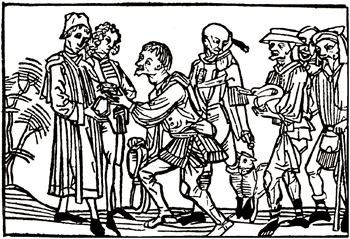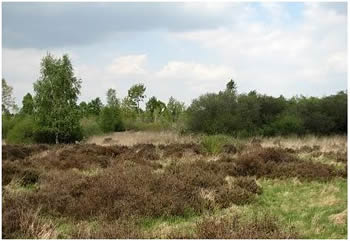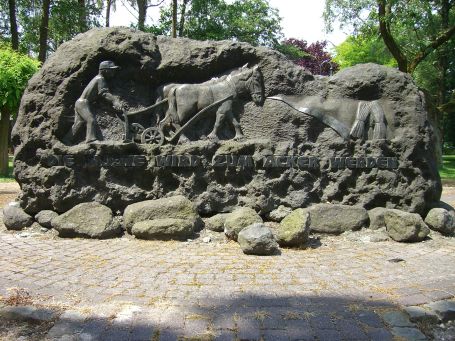You are in: Migration Museum > Migration Movements> Southwestern Germany in the 18th Century
Migration Movements1
(part 2 of 4)
Southwestern Germany in the 18th Century
![]() n 1741 there was a new wave of emigration from the Electoral Palatinate2 of Lutheran and Reformed2 (Calvinistic) families from the Palatinate. Also, following the English enticements and promises to rebuild Virginia, North Carolina, New York and Pennsylvania as their predecessors. Most immigrants came from Biebern, Bierbertal and Hunsrück.
n 1741 there was a new wave of emigration from the Electoral Palatinate2 of Lutheran and Reformed2 (Calvinistic) families from the Palatinate. Also, following the English enticements and promises to rebuild Virginia, North Carolina, New York and Pennsylvania as their predecessors. Most immigrants came from Biebern, Bierbertal and Hunsrück.

Rhine ship
The Group of Lutheran and reformed emigrants, like their predecessors at the end of the 17th Century, moved downriver to Rotterdam in the Netherlands then to England where they embarked to North America. However, through the naval war between England and Spain3 (1739-1742) they were stopped in Schenkenschanz on the Dutch border.

Farmers Pay the Tithe
A return was out of the question, because a migration carried out with the permission of the authorities was connected with the payment of various fees for, i.e. release from serfdom, for which in the 18th Century in the electoral Palatinate included payment of a tenth of the assets. Added to this was the so-called ‘after tax’, which was basically raised by an assessment for each ppossession that left the country, as well as chancellery and writing fees. With the release from serfdom or the etirement of civil rights, an emigrant gave up not only his obligations (duties), but the loss of all rights, which one could not easily acquired again.

Heath
Finally the emigrants renounced to their emigration to America and asked on the spot for settlement land.
From this settlement were founded the villages of Pfalzdorf in 1747, Louisendorf in 1820 and Neulouisendorf in 1826 which are now located in the Federal State of North Rhine-Westphalia.

Memorial Stone in Pfalzdorf:
"The desert will be a fruitful field."
1 Thanks to S. Winkler for help with the English translation of this page
2 Religious refugees from the Palatinate = In 1688 France, which was under the rule of King Louis XIV, attacked the Palatinate. Many inhabitants of the Palatinate, who professed the Reformed (Calvinist) faith had to leave their homeland. Among them, Huguenots, who had previously fled from France. They fled to Magdeburg, which belonged to the Protestant Electorate of Brandenburg since in 1648. Under the protection of the Elector the refugees received permission to found, in the city of Magdeburg, the Palatine colony which had an own town hall, mayor, courts and civil guard. This colony existed from 1689 until 1808 when the special status of the colonies was abolished. Elector Frederick III (Frederick I of Prussia from 1701 to 1713), granted the refugees in the Edict of Potsdam, the same privileges as the earlier immigrant Huguenots.
2 Reformed = Protestant confessional communities, which were transmitted by Huldrych Zwingli and John Calvin.
3 Naval war between England and Spain = Naval war between England and Spain = In London, the British Parliament was presented with the ear of sailor Robert Jenkins on 19 October 1739, which, it was said had been cut off by the Spaniards.
The scandal over the fact was the reason for the so-called ‘Ears War’ (War of Jenkin's Ear), the root causes of which were colonial disputes.
Jenkins entered Parliament just as tensions between England and Spain were very great. The disputes between the colonial powers already existed for years. The Spaniards did not want to tolerate the increase in smuggling trips of English ships and the English objected to the numerous inspections of their vessels provoked.
The fighting lasted three years, ended without a winner and finally went on from 1740 until 1748 when in the War of Austrian Succession ended.


